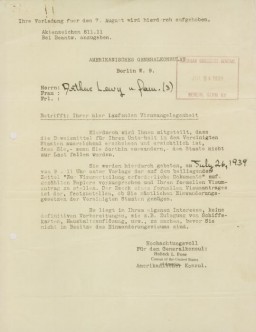You searched for: used%E4%BA%A4%E6%98%93%E7%A8%8B%E5%BA%8F%E5%BE%8C%E8%87%BA%E6%BA%90%E7%A2%BC%E3%80%90tg%EF%BF%BD%EF%BF%BD%EF%BF%BD%EF%BF%BD%EF%BF%BD%EF%BF%BD%EF%BF%BD%EF%BF%BD%EF%BF%BD%40ek7676%E3%80%91%E5%B9%B3%E5%8F%B0%E5%8C%85%E7%BD%91%E6%90%AD%E5%BB%BAusd%E4%BA%A4%E6%98%93%E7%A8%8B%E5%BA%8F%E5%BE%8C%E8%87%BA%E6%BA%90%E7%A2%BC%E3%80%90tg%EF%BF%BD%EF%BF%BD%EF%BF%BD%EF%BF%BD%EF%BF%BD%EF%BF%BD%EF%BF%BD%EF%BF%BD%EF%BF%BD%40ek7676%E3%80%91%E5%B9%B3%E5%8F%B0%E5%8C%85%E7%BD%91%E6%90%AD%E5%BB%BAivkcss1pgu
<< Previous | Displaying results 1621-1630 of 1831 for "used%E4%BA%A4%E6%98%93%E7%A8%8B%E5%BA%8F%E5%BE%8C%E8%87%BA%E6%BA%90%E7%A2%BC%E3%80%90tg%EF%BF%BD%EF%BF%BD%EF%BF%BD%EF%BF%BD%EF%BF%BD%EF%BF%BD%EF%BF%BD%EF%BF%BD%EF%BF%BD%40ek7676%E3%80%91%E5%B9%B3%E5%8F%B0%E5%8C%85%E7%BD%91%E6%90%AD%E5%BB%BAusd%E4%BA%A4%E6%98%93%E7%A8%8B%E5%BA%8F%E5%BE%8C%E8%87%BA%E6%BA%90%E7%A2%BC%E3%80%90tg%EF%BF%BD%EF%BF%BD%EF%BF%BD%EF%BF%BD%EF%BF%BD%EF%BF%BD%EF%BF%BD%EF%BF%BD%EF%BF%BD%40ek7676%E3%80%91%E5%B9%B3%E5%8F%B0%E5%8C%85%E7%BD%91%E6%90%AD%E5%BB%BAivkcss1pgu" | Next >>
-
Charles (Karel) Bruml
ID CardCharles was born to a Jewish family in Prague, the capital of Czechoslovakia. His father owned several shoe factories there. Prague's Jewish minority enjoyed a great deal of cultural freedom because of the new democratic Republic. Though antisemitism still existed in Czechoslovakia, Prague was a relatively tolerant city. 1933-39: Charles' father's business thrived in Prague, and they lived well. Charles enjoyed painting as a child and decided to study at an art school in the city. On the morning of March…
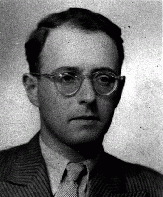
-
Fritz Silten
ID CardFritz was the youngest of two sons born to a Jewish family in the German capital of Berlin. In the late 1920s he earned a doctorate in chemistry and pharmacy. In 1931 he married Ilse Teppich, and in 1933 the couple had a daughter, Gabriele. 1933-39: Fritz worked in his father's pharmacy until 1938, when the Nazis forced them to sell the business for a fraction of its value to an "Aryan" German [Aryanization]. Leaving his parents behind was agonizing, but concern for the safety of his wife and daughter…
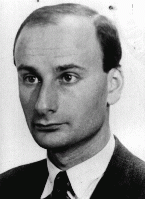
-
Jeno Brieger
ID CardJeno was born into a large, religious Jewish family in the village of Nagyhalasz in northeastern Hungary. The Briegers spoke Yiddish and Hungarian. After Jeno's mother died, his father remarried and the family moved to the town of Nyiregyhaza where his father owned and operated a hardware store. Nyiregyhaza had a Jewish population of 5,000. 1933-39: Jeno was the oldest son in a household of seven children. Nyiregyhaza was a rural town in which people still used horses and buggies. Jeno attended a…
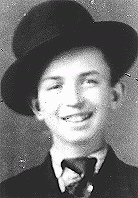
-
Gyula (Gyuszi) Brieger
ID CardGyula was also known as Gyuszi. He was born into a large religious Jewish family in the village of Nagyhalasz in northeastern Hungary. The Briegers spoke both Yiddish and Hungarian. After Gyula's mother died, his father remarried and the family moved to the town of Nyiregyhaza, where his father owned and operated a hardware store. Nyiregyhaza had a Jewish population of 5,000. 1933-39: Gyula was the second oldest son in a household of seven children. Nyiregyhaza was a rural town in which people still used…
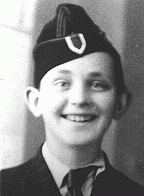
-
Bernard Krakauer
ID CardBernard was one of seven children born to a German-speaking, Jewish family in the small Moravian town of Mikulov in the central part of Czechoslovakia. The family later moved to the town of Hodonin where Bernard opened a dry-goods and clothing store. In 1899 he married Berta Koselova, and the couple had six children. During World War I Bernard served in the Austro-Hungarian army. 1933-39: In 1938 Bernard retired, and since none of his sons wanted to take over the business, Bernard sold it. He, his wife,…
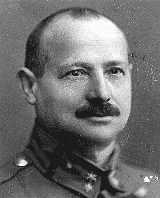
-
Eva Miodelska
ID CardEva was the oldest of four children born to a Jewish family in the central Polish town of Lipsko, about 30 miles southeast of Radom. The family lived at #12 Casimirska Street and Eva attended a private Jewish primary school. Eva's father owned a factory that produced shoes made from leather and cork. 1933-39: In the early 1930s Eva began secondary school in Zwolen, a town about 20 miles to the north. In 1936 her father left for Argentina to settle the estate of his deceased sister. For the two years he…
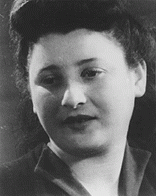
-
Peter Winternitz
ID CardPeter was the oldest of two children born to a Jewish family in the Czechoslovakian capital of Prague, a city with a Jewish community that dated back to the eleventh century. His family lived on Karlova Street in the city's Karlin district. Peter's father owned a wholesale business that sold floor coverings. 1933-39: As a boy, Peter was active in a Zionist sports organization, Maccabi Ha-Zair. The group also helped prepare youth to immigrate to Palestine [Aliyah Bet] by training them in agricultural work.…
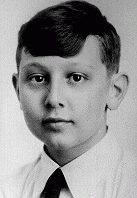
-
Bernburg T4 Facility
ArticleBernburg was the fifth of six centralized killing centers established by German authorities within the context of the Nazi “euthanasia,” or T4, program.
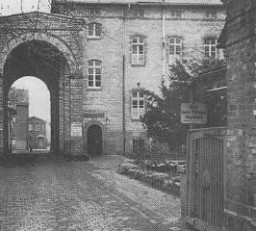
-
Martin Niemöller: "First they came for..."
ArticleLearn about the origins and legacy of Pastor Martin Niemöller's famous postwar words, “First they came for the socialists, and I did not speak out…”
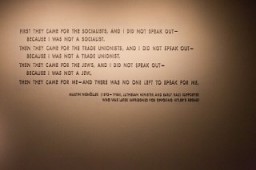
-
A notice sent by the American Consulate General in Berlin regarding immigration visas
DocumentA notice sent by the American Consulate General in Berlin to Arthur Lewy and family, instructing them to report to the consulate on July 26, 1939, with all the required documents, in order to receive their American visas. German Jews attempting to immigrate to the United States in the late 1930s faced overwhelming bureaucratic hurdles. It was difficult to get the necessary papers to leave Germany, and US immigration visas were difficult to obtain. The process could take years.
